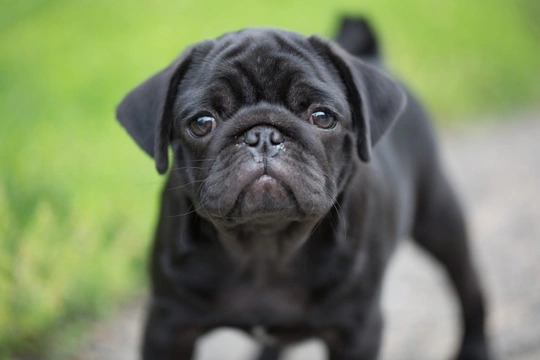
Five universal personality traits of the pug dog
The pug is a very distinctive looking small dog breed with an acutely curled tail, prominent eyes, and short, squashed-looking muzzle. Hugely popular as pets both within the UK and all across the world, the pug has a wide-reaching appeal, and even people who initially discount owning a pug based on their appearance will often fall for the breed’s charms once they meet one, and get used to their personalities.
Pugs are fun-loving, friendly and very social, and make for very rewarding companions, as well as having the added benefits of being comfortable in even small homes, and not having hugely onerous exercise requirements when compared to many other breeds.
All dogs are of course individuals, and this is never truer than for the pug; but nevertheless, the pug breed as a whole shares a range of almost universal personality traits that all pug lovers and owners will be intimately familiar with. Read on to learn more.
They have a real sense of humour
The pug is often referred to as the canine of the comedian world, and their rather unusual appearance certainly lends itself to this! If ever a dog had a sense of humour, the pug would be the one, and they can be hilariously entertaining to watch at play, and often seem to be in on the joke when other things are going on around them!
The internet is full of pictures of pugs dressed up in funny outfits, and rather than tolerating this with a sense of resignation, most pugs actually seem to very much enjoy the attention and good spirits that come with it, and anything else besides that involves having a good time and lots of fun!
They’re very loving
Pugs are highly affectionate little dogs that bond strongly with their owners, and love to cuddle up with their family and get involved in family life. They are excellent with people of all ages, and thrive when living with either children that will play with them, or elderly people who simply spend a lot of time with them.
They generally love to meet new people and will show a lot of affection for anyone who has time for them, and they are very gentle with nervous people and small children. However, if you show signs of being willing to play or roughhouse with your pug, they are on board with that too!
They also tend to be excellent with other dogs that they meet out and about, and many pugs live very happily with, and bond strongly with family cats.
They can be stubborn
Pugs tend to be real people-pleasers, who soon learn that you catch more flies with honey than you do with vinegar! Pugs are adept at wrangling treats out of people and performing for attention, but if you try to get your pug into something that they don’t want to do, be prepared for some stiff resistance! As a fairly laid-back breed that tends to take life in its stride, there is not a lot that phases the pug, but when you do find something that your pug doesn’t like-such as visiting the vet, taking a bath or being closed out of a room- they are apt to dig their heels in and refuse to have anything to do with it!
They are almost cat-like in their behaviour
The pug breed is one that often wins over cat fanatics that are otherwise not overly enthusiastic about dogs, and it is often said that the behaviour of the pug is very cat-like. They enjoy their home comforts in much the same way that cats do, but like to have things on their own terms too, and have a fairly independent streak and generally, are happy doing things on their own sometimes as well.
Their general demeanour, methods of communication and even the way that they sleep and eat have many similarities with cats, and this is possibly part of the reason why pugs do tend to get on well with cats, when properly introduced, as they have an uncanny ability to think in rather cat-like ways!
They can be fairly lazy!
Pugs seem to have two basic speed settings: Stationary or full speed ahead. Pugs can be very playful, energetic and enthusiastic about things, and will often get very excited about going for their walks or having the chance to play, but when you pug is asleep or tired, the “do not disturb” sign is most definitely on the door!
Pugs generally expend their energy in short bursts of activity, followed by flumping out to recuperate on the sofa until dinnertime. They do not make for great jogging or hiking partners, but they do like short, regular periods of exercise that give them the chance to socialise, let off steam and run around.



